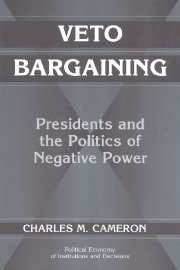Book contents
- Frontmatter
- Contents
- List of Tables and Figures
- Preface
- 1 Divided Government and Interbranch Bargaining
- 2 A Natural History of Veto Bargaining, 1945–1992
- 3 Rational Choice and the Presidency
- 4 Models of Veto Bargaining
- 5 Explaining the Patterns
- 6 Testing the Models
- 7 Veto Threats
- 8 Interpreting History
- 9 Conclusion
- References
- Index
- Titles in the series
1 - Divided Government and Interbranch Bargaining
Published online by Cambridge University Press: 20 January 2010
- Frontmatter
- Contents
- List of Tables and Figures
- Preface
- 1 Divided Government and Interbranch Bargaining
- 2 A Natural History of Veto Bargaining, 1945–1992
- 3 Rational Choice and the Presidency
- 4 Models of Veto Bargaining
- 5 Explaining the Patterns
- 6 Testing the Models
- 7 Veto Threats
- 8 Interpreting History
- 9 Conclusion
- References
- Index
- Titles in the series
Summary
American political scientists have rediscovered what the foremost historian of the Founding Era calls “the major justification for all the constitutional reforms the Republicans proposed” in 1789, the principle “expanded and exalted by the Americans to the foremost position in their constitutionalism,” in fact “the dominant principle of the American political system” (Wood 1969:449, 604). That principle is the separation of powers.
The impetus for the rediscovery is no mystery: the continuing reality of split party control of Congress and the presidency, “divided government.” In the half century since the end of World War II, from 1945 to 1994, the Republican and Democratic parties simultaneously controlled different parts of the American federal government in twenty-eight years, 56% of the time. By the late 1980s the pattern had become the norm, and political scientists could no longer dismiss divided government as anomalous. The resulting intellectual shock was neatly captured by the title of James Sundquist's influential 1988 article: “Needed: A Political Theory for the New Era of Coalition Government in the United States.”
How could political scientists need a theory of divided government in 1988, when the American federal government had shown such a persistent tendency toward split party control – 40% of the time in the century and a half since the full emergence of the party system in the 1830s? The answer lies in the theory of American government forged around the turn of the century by the founders of modern political science in the United States. For key members of this generation, the separation of powers was not the genius of the American system; it was the problem with the system.
- Type
- Chapter
- Information
- Veto BargainingPresidents and the Politics of Negative Power, pp. 1 - 32Publisher: Cambridge University PressPrint publication year: 2000



